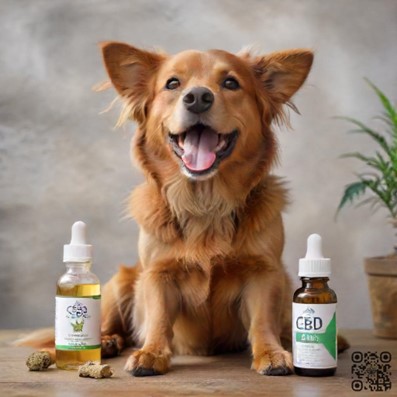A vet's perspective...
 Vets working with agility dogs at Greenway Veterinary Acupuncture have
noticed a growing interest amongst owners in CBD
supplements. With the increasing popularity of CBD for both humans and pets,
it's important to understand what CBD is, its effects and what the current
research says about its use in dogs. In this article, they'll be sharing some key
information to help you have an informed discussion with your vet about CBD for
yur agiity partner. agility
partner. Vets working with agility dogs at Greenway Veterinary Acupuncture have
noticed a growing interest amongst owners in CBD
supplements. With the increasing popularity of CBD for both humans and pets,
it's important to understand what CBD is, its effects and what the current
research says about its use in dogs. In this article, they'll be sharing some key
information to help you have an informed discussion with your vet about CBD for
yur agiity partner. agility
partner.
CBD,
or cannabidiol, is a compound found in hemp plants. It's part of a family of
compounds called cannabinoids. Interestingly, mammals, including dogs, naturally
produce their own cannabinoids in their bodies. CBD supplements are designed to
interact with the same systems that these natural cannabinoids do.
It's
crucial to note that CBD is different from THC, another well-known cannabinoid.
THC is the compound responsible for the 'high' associated with marijuana use. If
a CBD product is to be included in a pet's treatment plan, your veterinary
surgeon will prescribe one that contains zero or negligible
amounts of THC. The THC content can be checked on the CBD oil's Certificate of
Analysis and generally should be less than 0.03%.
How
does CBD work?
CBD interacts with
receptors in the body that are part of the endocannabinoid system. This system
plays a role in regulating various physiological processes. While explicit
health claims can't be made for non-medical CBD, research has shown that the CBD
molecule acts on receptors in the body to release or inhibit a multitude of
different neurotransmitters. The main specific effects of this interaction are
thought to be anti-inflammatory and in moderating pain perception.
Types of CBD products
It is important to note
that there are NO CBD products licensed for use in dogs and other pets in the
UK. Some brands like to suggest that they supply CBD ‘for pets' but as this is
not a permissible claim in the UK, you will find that either the link redirects
to a non-UK site or to a hemp oil product. The latter contains no CBD but may
have some beneficial supplement compounds within it like omega oils and
phytochemicals (eg plant terpenes). The former should be avoided as the product
will not be under UK jurisdiction and potentially illegal and dangerous if the
THC content is too high or it claims that you can give the CBD product to your
dog without a prescription.
When looking at CBD
products, you may come across two main types:-
-
CBD Isolates: These contain only CBD.
-
Broad Spectrum CBD: These contain CBD
along with other cannabinoids and compounds called terpenes, found
naturally, in varying amounts, in hemp plants.
Some research
suggests that broad spectrum products may have enhanced effects due to the
interaction between these various compounds, sometimes referred to as the
'entourage effect.'
Legal considerations
For human use, CBD is
classed as a ‘food supplement', but in the UK, it is classified as a 'veterinary
medicine' when given to animals. This means that CBD, as with all other
veterinary medicines, should only be given to pets under the direction of a
registered veterinary surgeon with a prescription.
When asking your vet
about CBD, it's useful to understand that as vets, we are all subject to strict
prescribing regulations - one of these is that a prescription for a patient for
a non-licensed medication such as CBD can only be provided if other medications
licensed specifically for the species and the condition have been tried or
considered first. Only then can we prescribe CBD and it is concluded that in
a trial of it might be beneficial to your pet in this particular circumstance.
Another legal
consideration is that the amount of total THC in a bottle of CBD could also
breach the legal limit. In some brands available for sale to the public, it
could be as high as 0.2% THC, despite being advertised as ‘low THC' and would
strictly speaking not be legal to sell, depending on bottle size.
Research on CBD in dogs
No branded CBD product on
general sale to the public in the UK can make therapeutic claims as there are
none that have undergone veterinary clinical trials and been granted a licence
as yet. Research has however been conducted into how CBD affects the physiology
of dogs, observed side effects and clinical efficacy for conditions such as
osteoarthritis (OA).
A study out of Cornell University and
Colorado State University in 2018 concluded that twice daily dosing increased
comfort and activity in dogs with OA in the trial and that there were no
observable side-effects for the duration of the study, though this was only a
few weeks long and the number of dogs in the study was small.
Another more recent
study examined the effects of CBD when used alongside other medications. The
researchers noted potential benefits when CBD was co-administered with other
drugs, possibly allowing for lower dosages of those medications.
It's important to
note that these studies had limitations, including small numbers of
participants, short durations and limits on standardisation and comparison of a
naturally variable plant extract. More research is needed to fully understand
the full effects of CBD and other associated hemp plant compounds in dogs.
Safety considerations
While the studies mentioned
above didn't report significant side effects, they did note some changes in
liver enzyme levels in some dogs. This suggests that it may be prudent to
monitor liver enzymes in dogs prescribed CBD long-term, similar to what we do
for dogs on other medications. Again, the THC content should be carefully
checked on the official laboratory test report (Certificate of Analysis) as some
CBD oils available for sale to the public are as high as 0.2% THC, which could
potentially be toxic to pets.
Choosing a CBD product
If you're considering
speaking to your veterinary team about CBD for your agility dog, here are some
checks that you and your vet will want to be aware of:
-
Look for a
Certificate of Analysis (COA) for each batch from an accredited lab.
-
Be wary of
products that make clinical claims or say they are ‘for pets'. There are no
CBD products specifically for pets legally available on general sale in the
UK.
-
Avoid
products marketed directly for pets without mentioning the need for a
veterinary prescription.
-
Consider a
broad spectrum product over CBD isolates as the additional phytochemicals
from the plant have potential benefits.
-
Make sure
the CBD content is clearly stated, along with the batch number and expiry
date.
-
'Hemp seed
oil' generally has zero CBD content.
-
Unless your
vet advises otherwise, check the THC content is below 0.03%.
Conclusion
As with any supplement or
medication, it's crucial to work closely with your vet when considering CBD for
your agility dog. They can help you weigh the potential benefits and risks,
ensure proper dosing and monitor your dog's health over time.
Remember, while CBD
is gaining popularity, it's not a magic solution. As knowledgeable owners and
trainers are fully aware, a holistic approach to an agility dog's mental and
physical health through individually tailored nutrition, training regimes and
routine veterinary care, remains the foundation of their well-being.
 About
the authors... About
the authors...
Drs Alastair and Claire Greenway BVM&S, MRCVS, ABVA
have
run Greenway Veterinary, a dedicated acupuncture home-visit practice for London and
and surrounding areas for over 20 years.
For more information,
visit their website.
First published
10th September 2024
|